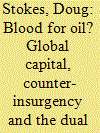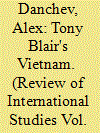|
|
|
Sort Order |
|
|
|
Items / Page
|
|
|
|
|
|
|
| Srl | Item |
| 1 |
ID:
079043


|
|
|
|
|
| Publication |
2007.
|
| Summary/Abstract |
What are we to make of the neoconservative challenge to traditional international thought? Should we content ourselves, as many have done, to return to classical realism in response? Rather than offer another realist assessment of neoconservative foreign policy this article turns to Hannah Arendt. In a very different language, Arendt articulated a critique of the dangers of moralism in the political realm that avoids realist cynicism. She is also better placed to challenge the neoconservative vision of international affairs, ideological conviction, and their relationship to democratic society. Reading Arendt against Leo Strauss suggests that the fundamental problem with neoconservative ideology concerns its understanding of the place of philosophy in the public realm, the relationship between political thought and practice, ideas and action. She suggests why neoconservatives may be experts at selling wars but seem less adept at winning them
|
|
|
|
|
|
|
|
|
|
|
|
|
|
|
|
| 2 |
ID:
079042


|
|
|
|
|
| Publication |
2007.
|
| Summary/Abstract |
The US-led invasion and occupation of Iraq coupled with the increased militarisation of international relations as part of the 'war on terror' has led to the development of a 'blood for oil' thesis that posits the centrality of oil and the economic interests of US oil corporations to American intervention in the Third World. This article argues that this thesis, whilst correct in identifying the importance of energy to US intervention, is not sufficiently attentive to the dual nature of American resource interventions whereby the American state seeks not only to ensure US oil supplies but also to maintain sufficient oil supplies for the global economy as a whole. American intervention is thus driven by oil to a large extent, but in different ways to those commonly suggested by 'blood for oil' theorists. In contrast to this thesis I argue that recent energy security moves to diversify oil acquisition away from the Middle East towards new areas such as South America, the Caspian region and Africa continue to be subject to this dual logic. Moreover, counter-insurgency warfare is increasingly being deployed to insulate oil-rich states from internal pressures which is in turn having a profound effect on human rights, social justice and state formation in the global South
|
|
|
|
|
|
|
|
|
|
|
|
|
|
|
|
| 3 |
ID:
079040


|
|
|
|
|
| Publication |
2007.
|
| Summary/Abstract |
As debate continues over the conduct, the legality and the morality of the war in Iraq, this article addresses how and why Prime Minister Blair decided on the British road to war in Iraq. The article argues that Tony Blair was working within a mindset at both the domestic and international levels that meant he was predisposed to use military force against Iraq and indeed against other perceived threats to the West. His mindset arose, we will argue, through fear rather than arrogance, through the experiences of the past two decades as much as contemporary events, and this meant that he systematically over-estimated the threat posed by Saddam Hussein. We postulate that Blair was not pressured into invading Iraq by President Bush. Rather, he believed that it was the right path for Britain to take, and that the overthrow of Saddam Hussein was actually the logical outcome of the 'Doctrine of the International Community' outlined in his Chicago speech in 1999. We go on to make the claim that by concentrating on supporting the United States in its grand strategy, Tony Blair misunderstood the pattern of politics at home and perhaps more seriously of the 'threat' to the domestic security of the United Kingdom. This was not a danger from Iraqi WMD or even from 'foreign' terrorists as had happened on 9/11 but from home-grown suicide bombers, some of whom claimed to be inspired by opposition to Blair's wars. This was the blowback that mattered - and will continue to do so - for the UK
|
|
|
|
|
|
|
|
|
|
|
|
|
|
|
|
| 4 |
ID:
079041


|
|
|
|
|
| Publication |
2007.
|
| Summary/Abstract |
This article argues that reconstruction is an emerging discourse of international politics that merges security and development discourses in powerful and troubling ways. We focus on Iraq as a site for articulating and institutionalising a particular version of reconstruction, uncovering five narratives that constitute Iraqi reconstruction discourse. We conclude by suggesting that reconstruction repackages security and development into a singular, technical, and bureaucratic worldview. This view obscures working and reliable solutions to poverty and instability by treating development as a central justification for war, and war as a promising way to develop a state and society
|
|
|
|
|
|
|
|
|
|
|
|
|
|
|
|
| 5 |
ID:
079044


|
|
|
|
|
| Publication |
2007.
|
| Summary/Abstract |
Borrowing from Norbert Elias, we introduce the habitus of restraint to the study of security communities. This habitus constitutes a key dimension of the glue that holds security communities together. The perceived compatibility of practices emanating from the habitus that members hold fosters the collective identity upon which a security community is built. The violation of a member's habitus by the practices of another member, however, disrupts the reproduction of collective identity and triggers a crisis of the security community. Our analysis of Germany's reaction to Washington's case for war against Iraq provides empirical evidence for the salience of the habitus for the internal dynamics of security communities
|
|
|
|
|
|
|
|
|
|
|
|
|
|
|
|
| 6 |
ID:
079039


|
|
|
|
|
| Publication |
2007.
|
| Summary/Abstract |
This article examines Tony Blair's policy and posture on Iraq through the prism of the special relationship in which he was reared. At the same time, it examines his policy and posture on the special relationship through the prism of Iraq. In this context it proposes a Vietnam analogy of a kind, with reference to Blair's white-hot predecessor Harold Wilson: a curious affinity of fate - disenchantment, disgrace, and moral ruination
|
|
|
|
|
|
|
|
|
|
|
|
|
|
|
|
| 7 |
ID:
079045


|
|
|
|
|
| Publication |
2007.
|
| Summary/Abstract |
Much of the post-Cold War discourse about contemporary warfare posits a binary opposition between a 'democratic peace' in the North and the prevalence of virulent 'new wars' in the South. This article seeks to qualify these accounts by bringing out the deeper historical and sociological legacies of state formation critical for understanding the emergence of an internal peace amongst developed countries and the continuing insecurity and multiple civil wars in many poorer developing regions. It is argued that two features of Southern state formation - the external imposition of states and the enforced norm against territorial aggrandisement - have significantly constrained the development of many developing states, making it more difficult for them to forge strong, synergistic states whose security concerns are externally- rather than internally-oriented. The article argues that there is, though, much variation in how Southern states have responded to these historical legacies of state formation. The article concludes with a four-fold taxonomy to replace the simple North-South bifurcation, differentiating between developed, globalising, praetorian and failed states and identifying the differing potential for, and incidence of, violent conflict, insecurity, and war within these four types of state
|
|
|
|
|
|
|
|
|
|
|
|
|
|
|
|
|
|
|
|
|